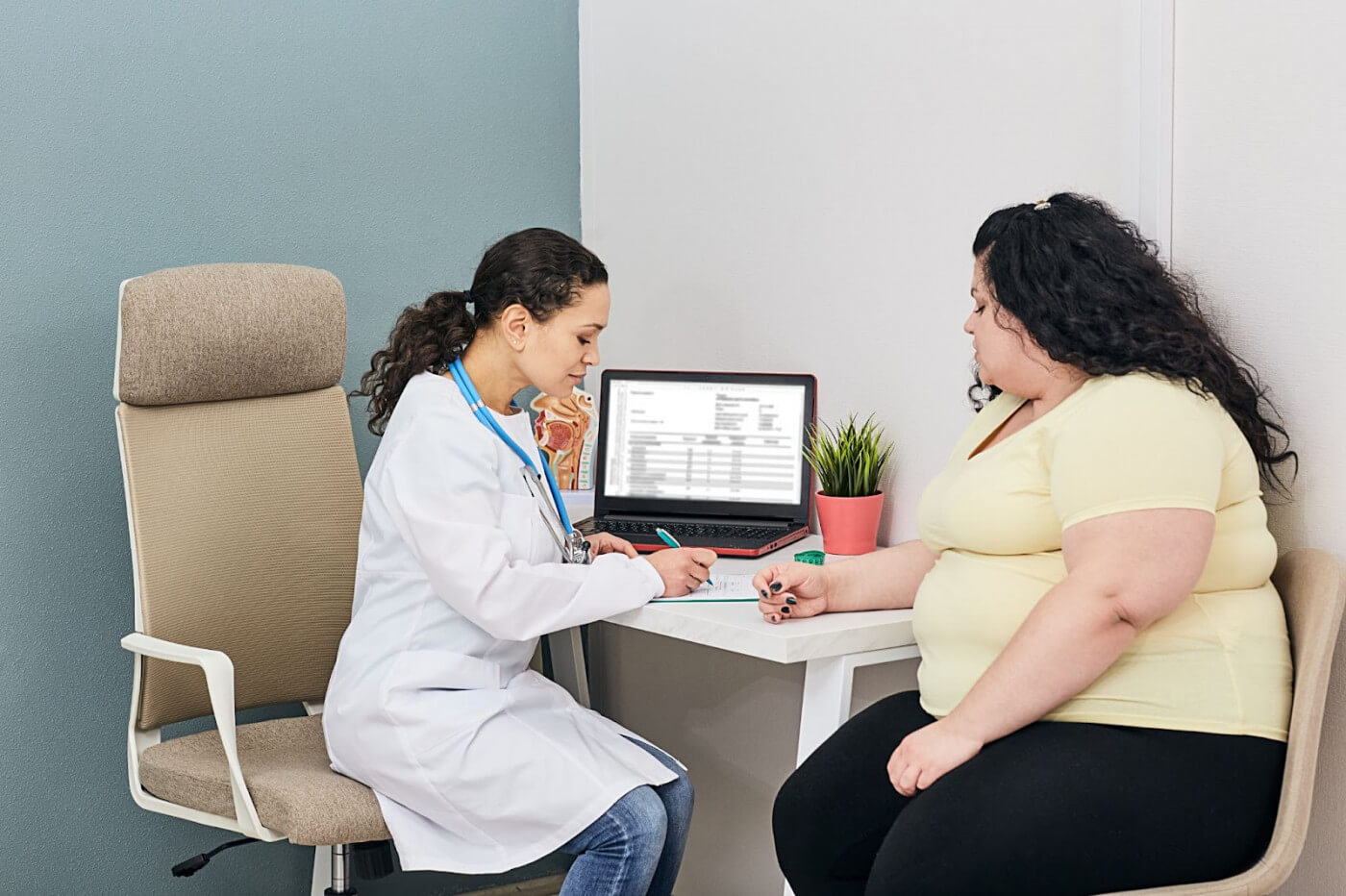Do you feel like you can’t lose weight, no matter how hard you try? Have you been struggling to drop those last few pounds for what feels like forever?
If so, you may be dealing with hormonal weight gain. A hormonal imbalance causes this type of weight gain, and it can be tough to overcome.
This article explains the meaning of hormonal weight gain, its symptoms, the hormones that cause it, and the conditions that lead to hormonal weight gain. We’ll also discuss tips on how to lose hormonal weight, so you can get your body and your confidence back.

What Is Hormonal Weight Gain?
Hormonal weight gain is an increase in weight caused by a hormone imbalance. Hormones are chemicals produced by glands in the endocrine system that regulate various functions, including metabolism, reproduction, and growth.
Hormones are chemical messengers that manage important body functions for systems all over your body, from your skin and hair to your stomach and brain. When these hormones are out of balance, it can lead to a number of symptoms—including weight gain.
Too little or too much of certain hormones can cause you to put on extra pounds. Unfortunately, hormonal weight gain is often difficult to lose, particularly if the underlying hormonal imbalance is left untreated.
Two types of hormones cause body weight gain: hormones that increase appetite and hormones that affect how the body stores fat.
1. Appetite-Stimulating Hormones
Hormones such as ghrelin and leptin play a role in regulating hunger and appetite. Ghrelin is often called the “hunger hormone” because it increases appetite and makes you feel hungrier. Leptin, on the other hand, is a hormone that signals to the brain that you are full and don’t need to eat anymore.
When these hormones are out of balance, it can lead to overeating and weight gain. For example, if you have too much ghrelin and not enough leptin, you may feel hungrier than usual and eat more food than you need.
2. Fat-Storing Hormones
Hormones such as insulin and cortisol can affect how the body stores fat. Although both hormones work differently, they are mainly responsible for regulating how fat is stored in your body. For instance, insulin is the hormone that helps the body store glucose (sugar) as glycogen in the liver and muscles. Glycogen is stored energy that can be used for fuel when needed.
Cortisol, on the other hand, is a stress hormone released from the adrenal glands in response to stress. When cortisol levels are high, it can increase appetite and cravings for high-sugar and high-fat foods. This can cause weight gain, especially in the abdominal area.

What Are the Symptoms of a Hormonal Imbalance?
The symptoms of hormonal imbalances vary from person to person. However, some common signs may indicate that you are dealing with this issue. These symptoms include:
1. Sudden or Unexplained Weight Gain
Hormonal imbalance can often lead to unexpected weight gain due to changes in appetite and metabolism. If you notice that you are gaining weight without changing your diet or lifestyle, it could result from a hormonal imbalance.
2. Difficulty Losing Weight
If you are eating healthy and exercising regularly but still struggling to lose weight, hormonal weight gain may be to blame. When hormones are out of balance, it can be tough to shed pounds. You should consult your doctor if you’re having difficulty losing weight through exercise.
3. Changes in Appetite
Constant feelings of hunger and cravings for high-calorie foods are symptoms of hormonal imbalance. If you find yourself eating more than usual or snacking more often than average, it may be due to changes in your hormones.
4. Fatigue
Hormonal weight gain can often make you feel tired, even after a good night’s sleep. This is because the body has to work harder to process and store excess fat. So if you’re always tired, it might be time to have your hormones tested.
5. Mood Swings
Hormones serve many functions within our bodies, such as controlling our mood. When they are out of balance, it can lead to feelings of sadness, anxiety, and depression. It may be due to hormonal imbalances if you suddenly feel down or hopeless without any prior cause.
Hormonal imbalances also often irritability. Even people who are usually easy going might find themselves snapping more often or feeling easily angered.

What Causes Hormones to Become Imbalanced?
Several things can cause hormones to become imbalanced. Some of these happen naturally over time. Others are caused by health problems.
1. Aging
As we age, our body’s hormones begin to change. As a result, hormones like estrogen and testosterone that regulate our weight begin to decline. This can cause weight gain and other symptoms of hormonal imbalance.
2. Pregnancy
Pregnancy is a very demanding condition that demands a woman’s body to undergo many changes. One of these changes includes increased certain hormones like estrogen and progesterone. These hormonal changes can lead to weight gain and other symptoms like fatigue and mood swings. It’s also why it’s often so hard to lose your baby weight, even months after giving birth.
3. Polycystic ovary syndrome (PCOS)
PCOS is a condition that affects the way the ovaries produce hormones. It occurs when the ovaries produce too much of the hormone testosterone. This can lead to weight gain and other symptoms like irregular periods and fertility problems.
Women with PCOS often have high levels of androgens, leading to weight gain. PCOS can cause other symptoms like irregular periods, acne, and thinning hair.
4. Hypothyroidism (Low thyroid hormone levels)
Hypothyroidism is when the thyroid gland doesn’t produce enough of the hormone thyroxine. This can lead to a slow metabolism, which can cause unexplained weight gain. Hypothyroidism can also cause other symptoms like hair texture changes and severe fatigue.
5. Menopause
Menopause is a time in a woman’s life when her ovaries stop producing eggs, and her hormone levels decrease. This can lead to weight gain and other symptoms like hot flashes and vaginal dryness.

How to Lose Weight Caused by Hormones
If you are dealing with hormonal weight gain, there are some things you can do to lose weight and get your hormones back on track.
Consult Your Doctor
If you are struggling to lose weight, it is essential to consult your doctor. They can help determine if your weight gain is due to a hormone imbalance or another underlying condition. They can also help you develop a plan to lose weight and get your hormones back on track.
Start Hormone Replacement Therapy
Hormone replacement therapy (HRT) can be used to replace hormones that are out of balance. This can help relieve symptoms of hormonal imbalances and help you lose weight.
Click HERE to learn more about HRT, the health benefits you can expect from treatments, and how to save money on your therapy.
READ NOW: IS HORMONE REPLACEMENT THERAPY RIGHT FOR YOU?
Watch Your Diet
What you eat can have a significant impact on your hormones. Eating a healthy diet with plenty of fruits, vegetables, and whole grains can help balance your hormones and promote weight loss.
Avoiding processed foods, sugary drinks, and excessive amounts of fat can also help to regulate your hormones and promote weight loss.
Exercise
Exercise is a great way to lose weight and get your hormones back on track. Getting regular exercise can help to boost your metabolism and burn off excess fat. It can also help reduce stress levels, further promoting hormone balance.
Reduce stress
Too much stress can lead to hormone imbalances that can cause weight gain—cortisol in particular. Finding ways to reduce stress in your life can help to promote hormone balance and weight loss. Some stress-reducing activities include yoga, meditation, and spending time in nature.
Start the Trim & Fit Weight Loss Program
Trim & Fit is The Resurge Clinic’s medically supervised weight loss program that enables you to reach and maintain a healthy weight without excessive dieting or exercise. It uses objective data—your personal bloodwork—to measure your improvement and help you feel your best while promoting optimal wellbeing.
LEARN MORE ABOUT THE TRIM & FIT WEIGHT LOSS PROGRAM

Dealing with Hormone-Caused Weight Gain
Hormonal weight gain can be caused by various things, including aging, pregnancy, PCOS, hypothyroidism, and menopause. If you are struggling to lose weight and you think it may be due to hormonal imbalance, there are some things you can do to get your hormones back on track.
Consult your doctor, watch your diet, exercise regularly, and find ways to reduce stress in your life. Then, with patience and effort, you should be able to overcome hormonal weight gain.
If nothing you do seems to work, we’re here to help. Schedule a consultation now to have your hormones and blood sugar levels tested. We’ll work together to identify why you’re gaining weight. Then we’ll create a customized plan to help you shed those extra pounds while improving your overall health.



